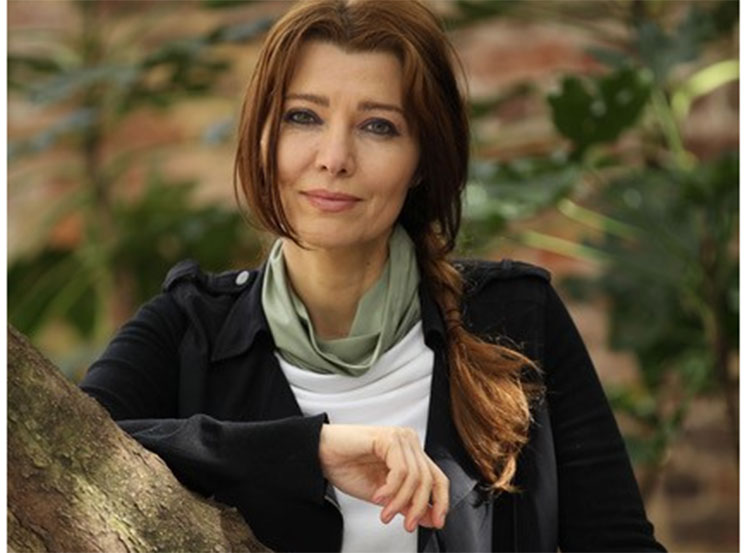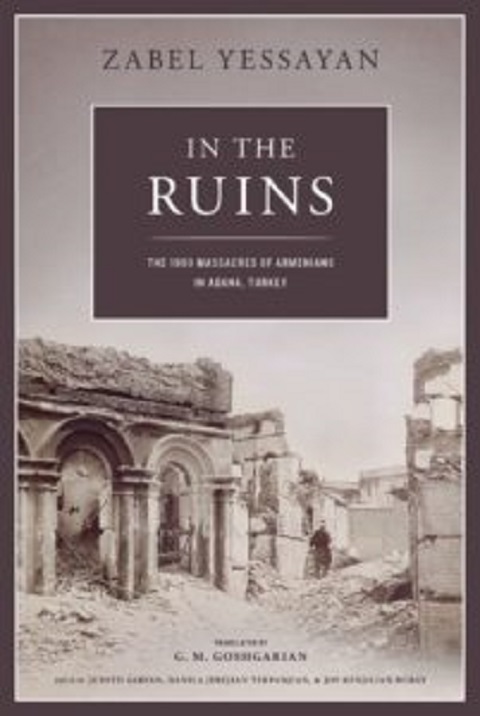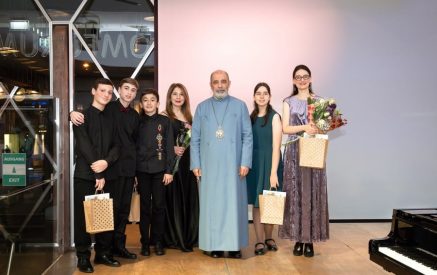By Claire Armitstead
LONDON (The Guardian) — In Elif Shafak’s latest novel, a single raindrop rises and falls through millennia. In Nineveh, in the seventh century BC, it lands on the scalp of Ashurbanipal, a king whose obsession with building a great library saves the Mesopotamian epic of Gilgamesh from destruction for blasphemy; in 19th-century Constantinople, it lands on Arthur, who has just arrived on an official mission to find a missing section of the epic, depicting a pre-biblical flood. It reappears as the last drop of water in a bottle that terrified 21st-century Yazidis carry with them on their flight from slaughter into the parched mountains of Iraq.
The ninth novel the Turkish author has written in English and her 13th overall, There Are Rivers in the Sky is a story of “three characters, two rivers and one poem,” she says. The rivers are the Thames and the Tigris, and the poem is Gilgamesh. But Shafak wanted to make a drop of water the unifying motif, she explains, because “when we talk about climate crisis we’re talking about a crisis of fresh water, which affects everyone, but in some parts of the world it’s particularly bad. Seven of the most water-stressed nations are in the Middle East and north Africa, and it has massive consequences for women and impoverished people.”
We’re talking in the study of Shafak’s London home, where books of every genre tower in bookcases over a large leather-topped desk, beneath which a little white dog called Romeo makes himself comfortable. “I do a crazy amount of research,” Shafak says. “You know, I was in academia for a long time, in political science, women’s and cultural studies. That interdisciplinary knowledge is something that I really treasure, and I don’t like it when people put it into separate boxes. I love novels that are full of ideas, multiplicity, nuances, layers – this really speaks to my heart. So there’s a lot of research, but there’s also a lot of imagination and intuition.”
When we meet, it is the end of the school term, and both Shafak’s teenage children are hanging around, having just finished important exams. But an aura of serenity emanates from the household, as well as from Shafak herself. The surfaces are uncluttered. She glides in with glasses of tea and large slices of homemade cake, before settling down to explain her dismay about the state of the world and her belief that fiction is one of its last democratic spaces.
It’s not that Shafak is averse to other forms of discourse. Her novels are interspersed with works of nonfiction, most recently an elegant meditation on the impact of social media, How to Stay Sane in an Age of Division. She has delivered three Ted Talks, written multiple newspaper opinion columns, and gives regular updates to her 1.6 million followers on X (formerly Twitter). She also has her own weekly Substack, titled “Unmapped Storylands,” to mop up anecdotes and insights from her personal diaries. These range from neglected historical characters she has discovered to musings on the idiosyncrasies of language, and writers’ tips (“Do not spill tea on keyboard”).
But the novels are central. “In many ways,” she says, “I think fiction is the antidote to our extremely polarized and fractured times. It’s a place where we can still hold nuanced conversations, have multiple thoughts at the same time, open up difficult issues and calmly ruminate. And also do some slow thinking, because we’re always rushing into judgments. It’s about empathy, trying to put yourself in the shoes of another person, to become that person for a few hours over a few days. I think that’s a very good and humbling exercise for the soul.”
Her own novels occupy a charmed space, where romance meets religion (Three Daughters of Eve), the political traumas of Cyprus are observed by a fig tree (The Island of Missing Trees) and an entire novel is narrated from a rubbish bin by a murdered Istanbul sex worker (the Booker-shortlisted 10 Minutes 38 Seconds in This Strange World).
“I’m interested in mixing east and west, folk story with the European canon. I want my fiction to be bridge-building, but my heart always goes towards the peripheries – to people whose stories we don’t hear about, truths that have been erased,” Shafak says. “In some ways this is my own journey, because of the way my life evolved. None of us belongs in a single box but I have a multiplicity.”
Shafak spent her early years with her grandmother, after her parents split up and her philosopher father disappeared from her life for 20 years. Unusually for a Turkish woman of her generation in a conservative neighborhood of Ankara, her mother went back to university to complete the degree she had dropped out of to get married.
Her grandmother, says Shafak, was “a bit of a healer,” who would melt lead to ward off the evil eye, and was also a storyteller, “so I’m very deeply versed in the oral culture of Anatolia”. At the age of eight, Shafak started writing a diary. “But real life was so boring that I had almost nothing to say, and so I started to write about people who didn’t exist and things that hadn’t happened. It was a very quick journey from diaries into short stories, and from that moment onwards, I kept writing, always.”
When she was 10, life suddenly became more challenging. Her mother graduated with multiple languages, landed a job with the foreign ministry – and her first posting was Spain. “It was a huge culture shock for me to be zoomed into this very international, posh school in the middle of Madrid, where I was the only Turkish student,” Shafak recalls. “I had to learn Spanish very fast. I had to learn English very fast, and I really cherished that experience. To be able to read Don Quixote in Spanish; to suddenly discover that there’s a vast literature in English that I could now access – that was the brilliant part. The difficult part was keeping up with the other kids. I was a massive introvert and I was bullied at school a lot.”
Writing in another language gave me the distance to look at where I came from
Although Spanish was her second language, English became her safe space, in which she wrote poems and kept up her diary. Many years later, after publishing her early novels in Turkish, she made the decision to switch over entirely to English. “There came a moment in my life when I felt so suffocated,” she says. “But that was a very scary thing to do, because you’re nobody. You have to start from scratch again. At the same time, paradoxically, it was liberating, because being a novelist in Turkey is really hard, and being a woman is even harder. Everything you say, everything you write, can be attacked, targeted; you can be put on trial, exiled, imprisoned – words are heavy, you know. Writing in another language gave me the cognitive distance that I needed to be able to take a closer look at where I come from.”
The second novel that she published in English, The Bastard of Istanbul, dealt with the Armenian Genocide of 1915, which the Turkish state still does not acknowledge. It was longlisted for the women’s prize in the UK but found a different sort of notoriety in Turkey itself, where she was prosecuted for “insulting Turkishness”. Though she was later acquitted at the request of the prosecutor, she was also investigated for obscenity for 10 Minutes 38 Seconds in This Strange World, and for an earlier novel, The Gaze. Neither of those cases has been resolved, as a result of which she has now gone into voluntary exile from her homeland.
“For me,” she says, “the biggest turning point was being put on trial after The Bastard of Istanbul. I was pregnant at the time. And by coincidence, I was acquitted the day after I gave birth. The whole year was really unsettling. There were groups on the streets spitting at my picture and burning EU flags. I was accused of insulting Turkishness, even though nobody knew what that meant. And it was quite surreal, because the words of fictional characters were taken out of the novel and used as evidence in the courtroom, as a result of which my Turkish lawyer had to defend my Armenian fictional characters.”
She is keen not to paint a completely dark picture, “because I also received so much love from readers in Turkey”. But, she adds, “I think that scarred me in many ways. In terms of authorities, it’s very difficult to be a novelist in Turkey, especially the way I write, because I do question the silences in our history.”
There Are Rivers in the Sky goes into battle once again on two fronts that are unlikely to win Shafak friends among the powers-that-be across the Middle East. The first is against the dam-building of Turkey’s President Erdoğan, which led to the flooding of the ancient cave city of Hasankeyf on the Tigris, in Turkey’s predominantly Kurdish south-east region. Up to 80,000 people who had lived there were displaced, in what a local activist group described in 2020 as an “apocalypse”.
“This entire area is so precious, because of its history, but also its ecology. For a dam, which lasts only 50 years, they’ve destroyed thousands of years of cultural value and artefacts,” she says. “Also, when you build dams, it alters the flow of the water downriver, and affects other countries as well. So we need international solutions. We need countries to act together, rather than just one country taking the water for themselves.”
The second injustice it confronts is the persecution of the Yazidi people, a religious minority who have faced centuries of massacres across the Middle East. Fleeing the flooding of their valley, the characters of Narin and her grandmother blunder into the 2014 genocide by Islamic State in Iraq, when more than 5,000 were killed and thousands of women and children were taken prisoner and forced into sexual slavery.
“The Yazidis are one of the most maligned, misunderstood and mistreated minorities by almost every culture or religion surrounding them throughout history, and they are a very delicate, vulnerable, beautiful community,” Shafak says. “I want to talk about this, because, as we’re speaking, there may be close to 3,000 Yazidi women and girls still missing. And many of these women are held captive in – quote unquote – ordinary households in Turkey, in Syria, in Iraq, in Saudi Arabia.”
Just a few years ago, one Yazidi girl was rescued from a house in the Ankara neighborhood where Shafak herself grew up. “So I keep thinking, you know, just a few streets away from my grandmother’s home, in another ordinary house, a girl has been held captive and suffered horrific cruelties. How is it possible that people don’t see?” she asks. “How is it possible that they are so numb? There’s a lot we still need to talk about, because the genocide is not over yet.”
Underlying all the storylines are highly topical questions about colonial history and the ownership of cultural artefacts. As she was writing the novel, the temperature of the debate suddenly rose, with the scandals about alleged thefts from the British Museum in London and the provenance of objects at the New York’s Metropolitan Museum of Art.
“To whom does cultural heritage belong?” Shafak asks. “It’s a particularly important issue for many of us coming from the non-western world. Of course, it belongs to all humanity. But at the same time, it belongs to the minorities of the region, which we never talk about. It’s very complicated. There are multiple layers, you know. That’s why I wanted to write this novel – to tackle it.”



























































